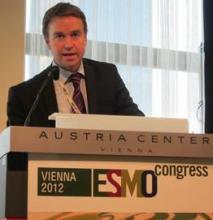VIENNA – Nearly one in five persons believes that their lifetime risk of cancer is nonmodifiable, a survey found.
"That’s clearly worrying," medical oncologist Dr. Derek Power said at the European Society for Medical Oncology Congress.
Equally disconcerting was the finding that 52% of survey respondents had a college degree and that 17% were health care professionals.
The 48-question, online survey was distributed to 748 people through the Irish Cancer Society.
The majority of the public (80%) and health care professionals (78%) were concerned about developing cancer, but only a small minority (20% and 10%) knew that cancer risk increases with age.
Smoking was ranked as the No. 1 risk factor for cancer by 87% of the cohort. Many overestimated the risk of cancer attributable to genetics, environment, and stress, however, and underestimated the cancer risks associated with age, obesity, and sunlight, said Dr. Power of Mercy University Hospital in Cork, Ireland.
In all, 47% of respondents thought cancer was caused by genetics, specifically family history genetics.
"That’s a huge overestimate," Dr. Power said at a press briefing. "Only about 20% of cancers are hereditary and significant numbers less than that are known to be caused by specific genes, about 5%-8%."
The World Health Organization estimates that about one-third of cancers are preventable by following a sensible diet, maintaining a normal body weight, and exercising, Dr. Power observed.
When the respondents were probed on specific aspects of diet, large knowledge gaps emerged. A significant proportion of respondents reported that "detox" diets (35%) and organic foods (61%) could reduce their cancer risk, but only 46% were aware that salt is a risk factor for cancer.
Vitamin and mineral supplements were also thought to be protective by 51% of the public and 54% of health care professionals, with less than half (40% and 28%) aware that red meat is a risk factor.
Despite years of evidence, only 27% of respondents were unaware that breast-feeding can help reduce breast cancer risk – a finding that has clear implications for any national health promotion strategy, Dr. Power said.
Similarly, only 42% of the public and 46% of health care professionals identified alcohol as cancer risk factor, despite its association with a number of cancers including esophageal, mouth, breast, and colorectal.
Interestingly, 63% of the public and 82% of health care professionals thought certain drinks were more dangerous than others, when in reality it is the quantity of alcohol consumed that is important, said Dr. Power. In addition, 39% of the respondents believed red wine was protective, although there is no data to support this.
Only 32% of the public and 41% of health care professionals were aware that obesity is a cancer risk factor, with 33% and 24%, respectively, unaware that the location of body fat is important.
When given a list of potential behaviors relevant to cancer risk, a stunning 48% of respondents thought that a blow to the breast could increase a woman’s risk of cancer, whereas 29% said wearing a tight bra could do so.
Other "cancer myths" about risks for which there is little supportive data were cell phone use (68%), aerosol use (71%), eating genetically modified foods (81%), and the effects of stress (94%).
"What we found is that a sizeable proportion of the population is misinformed about cancer risk," Dr. Power said.
One explanation for the poor knowledge of cancer risk factors, particularly in a cohort of so many college graduates and health care professionals, is that the cancer prevention message has been too narrow.
"A lot of national programs are very good at disseminating information on cardiovascular risk and diet through healthy eating and exercise, but for cancer prevention, what gets out there is really ‘Don’t smoke,’ " he said. "That’s the biggest thing the public was aware of, as you saw from our figures, but – in terms of lifestyle choices like obesity, healthy eating, physical exercise – that just doesn’t get out there amongst cancer prevention strategies."
Dr. Power said he hopes that the results of the survey will be used to highlight cancer risk misperceptions and that there will be more emphasis in national cancer prevention campaigns on lifestyle choices, particularly in light of the obesity epidemic and increasingly sedentary lifestyle of children.
He highlighted a recent report by the World Cancer Research Fund/American Institute for Cancer Research that grades the current evidence on the relationship between food, nutrition, and physical exercise for 17 cancer sites and offers 10 recommendations to reduce the risk of developing cancer (J. Fam. Health Care 2010;20:100-2).


